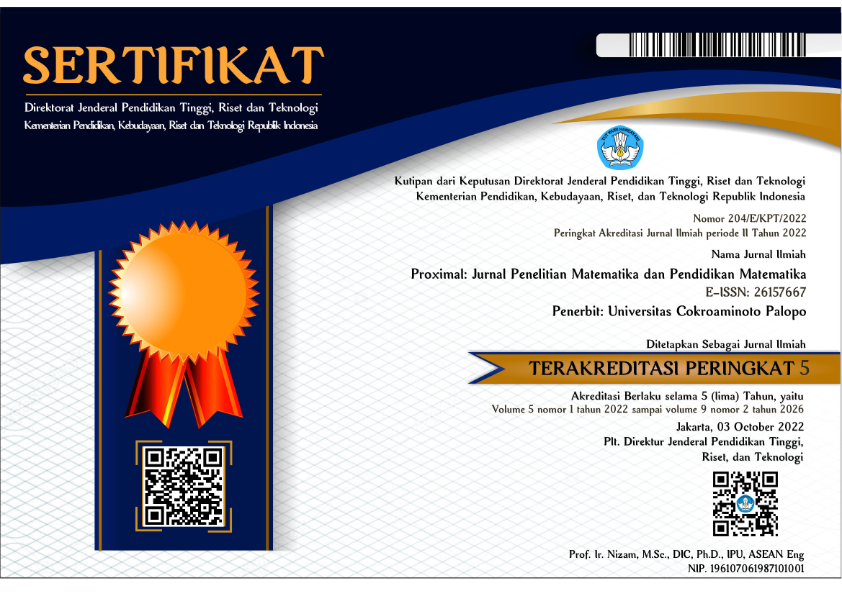Pengaruh Penerapan Model Pembelajaran Kooperatif Tipe STAD dengan Pendekatan Sosial Emosional Terhadap Motivasi dan Hasil Belajar Matematika
DOI:
https://doi.org/10.30605/proximal.v8i4.7163Keywords:
Cooperative learning, STAD, learning motivation, social-emotional approach, mathematics learning outcomesAbstract
Rendahnya motivasi dan hasil belajar matematika siswa menunjukkan perlunya pembelajaran yang tidak hanya berfokus pada aspek kognitif, tetapi juga mengembangkan aspek sosial dan emosional peserta didik. Penelitian ini bertujuan untuk menganalisis pengaruh penerapan model pembelajaran kooperatif tipe Student Teams Achievement Division (STAD) dengan pendekatan sosial emosional terhadap motivasi dan hasil belajar matematika peserta didik kelas VII SMP Negeri 13 Makassar. Penelitian ini merupakan pre-experimental design dengan pendekatan kuantitatif, menggunakan rancangan one group pretest-posttest design. Sampel penelitian terdiri atas 35 peserta didik kelas VII.1 yang dipilih melalui teknik cluster random sampling. Data dikumpulkan menggunakan angket motivasi belajar dengan lima indikator utama (ketekunan, minat, tanggung jawab, kemandirian, dan partisipasi) serta tes hasil belajar matematika berbentuk pilihan ganda. Analisis data dilakukan secara deskriptif dan inferensial menggunakan uji t (paired sample t-test). Hasil penelitian menunjukkan peningkatan signifikan pada kedua variabel. Motivasi belajar meningkat dari kategori sedang (rata-rata 69,20) menjadi tinggi (87,95) dengan N-Gain 0,72, sedangkan hasil belajar meningkat dari 70,10 menjadi 89,74 dengan N-Gain 0,86 dan ketuntasan klasikal 85%. Nilai Sig. (2-tailed) = 0,000 < 0,05 menunjukkan adanya pengaruh signifikan penerapan model terhadap peningkatan motivasi dan hasil belajar. Temuan ini menegaskan bahwa integrasi pendekatan sosial emosional dalam pembelajaran kooperatif STAD efektif dalam menciptakan suasana belajar kolaboratif dan empatik yang mendukung peningkatan prestasi belajar matematika siswa.
References
Andini, N., Yuliani, T., & Pratama, A. (2023). The impact of social-emotional learning on students’ motivation and engagement in mathematics. Journal of Education and Human Development, 12(2), 112–123.
Avandra, L., Hasanah, R., & Nurhayati, D. (2023). Integrating social-emotional competencies in mathematics learning: A classroom-based study. Indonesian Journal of Educational Research, 8(1), 44–59.
Cahyono, A., & Sulastri, D. (2020). Model STAD dalam meningkatkan hasil belajar matematika siswa SMP. Jurnal Pendidikan Matematika, 9(2), 76–83.
Goleman, D. (2021). Emotional intelligence and educational success: New perspectives for social learning. New York: Harper Collins.
Hake, R. (2019). Analyzing learning gains: A review of the normalized gain concept. Journal of Educational Evaluation, 6(3), 45–57.
Hasanah, F., & Himami, L. (2021). The effect of cooperative learning on students’ academic motivation in mathematics. Jurnal Pendidikan dan Pembelajaran, 15(1), 23–34.
Nasution, N., Karim, A., & Yusuf, R. (2023). Social-emotional learning and its influence on student collaboration and empathy. International Journal of Psychology and Education, 10(4), 85–97.
Ridwan, M., Syahputra, E., & Rini, P. (2022). Implementation of STAD learning to improve mathematical reasoning skills in middle school students. Journal of Mathematics Education, 14(2), 55–68.
Riwu, F., Siregar, H., & Sari, N. (2024). Effectiveness of STAD learning model on students’ mathematical achievement in junior high school. Journal of Educational Research, 9(1), 33–47.
Sanga, J., & Wangdra, K. (2023). Integrating SEL in classroom pedagogy: A systematic review. Global Education Studies, 11(1), 98–115.
Sari, R., & Suryadi, D. (2020). Collaborative learning in mathematics: Effects on student understanding and retention. Jurnal Pendidikan Matematika Indonesia, 11(3), 155–166.
Serpara, E., Nugraha, R., & Lestari, M. (2023). Enhancing student engagement through emotional intelligence-based learning. Journal of Educational Innovation, 7(2), 100–115.
Slavin, R. E. (2019). Educational Psychology: Theory and Practice (13th ed.). Pearson Education.
Sugiyono. (2022). Metode Penelitian Kuantitatif, Kualitatif, dan R&D. Bandung: Alfabeta.
Syahbana, D., Nur, A., & Haryanto, T. (2024). Implementasi profil pelajar Pancasila dalam pembelajaran matematika berbasis projek. Jurnal Inovasi Pendidikan, 13(1), 1–10.
Downloads
Published
Issue
Section
License
Copyright (c) 2025 Abdurrahman Hamid

This work is licensed under a Creative Commons Attribution 4.0 International License.
In submitting the manuscript to the journal, the authors certify that:
- They are authorized by their co-authors to enter into these arrangements.
- The work described has not been formally published before, except in the form of an abstract or as part of a published lecture, review, thesis, or overlay journal.
- That it is not under consideration for publication elsewhere,
- That its publication has been approved by all the author(s) and by the responsible authorities – tacitly or explicitly – of the institutes where the work has been carried out.
- They secure the right to reproduce any material that has already been published or copyrighted elsewhere.
- They agree to the following license and copyright agreement.
License and Copyright Agreement
Authors who publish with this journal agree to the following terms:
- Authors retain copyright and grant the journal right of first publication with the work simultaneously licensed under Creative Commons Attribution License (CC BY 4.0) that allows others to share the work with an acknowledgment of the work's authorship and initial publication in this journal.
- Authors are able to enter into separate, additional contractual arrangements for the non-exclusive distribution of the journal's published version of the work (e.g., post it to an institutional repository or publish it in a book), with an acknowledgment of its initial publication in this journal.
- Authors are permitted and encouraged to post their work online (e.g., in institutional repositories or on their website) prior to and during the submission process, as it can lead to productive exchanges, as well as earlier and greater citation of published work.















